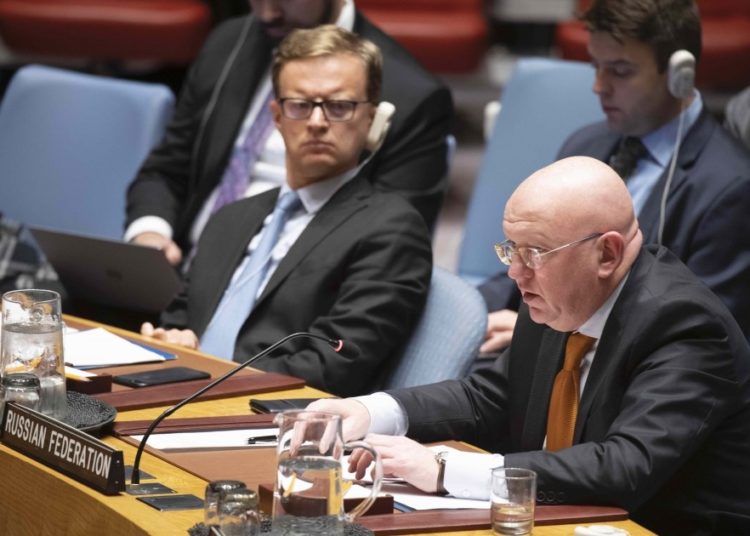Nordic Monitor
The top Russian diplomat at the UN warned Turkey against flirting with jihadist groups, during a UN Security Council (UNSC) meeting on Syria.
“We also warn against dividing terrorists into ‘the bad and the good ones.’ No matter what you call these groups — ISIL, ‘Jabhat al-Nusra,’ ‘Hayat Tahrir al-Sham,’ etc. — all of them profess the ideology of terror, murder and violence,” Vassily Nebenzia, Russia’s permanent representative to the UN, said.
Nebenzia’s remarks on October 24 came while he was informing UNSC members of a memorandum of understanding signed on October 22, 2019 by Russian President Vladimir Putin and his Turkish counterpart, Recep Tayyip Erdoğan, regarding the situation in northeast Syria.
His speech at the UNSC is considered a direct message to Turkey ahead of the first Syrian Constitutional Committee meeting to be held in Geneva on October 30. According to UN Special Envoy for Syria Geir Pedersen, the committee’s official launch “will be a sign of hope for the long-suffering Syrian people.”
Under an intra-Syrian agreement reached in Sochi in January 2018, the committee is to be composed of representatives from the Syrian government, the opposition and civil society representatives, each with 50 members. Speaking at a press conference on Monday, Pedersen said a smaller constitution drafting body of 45 will start their work after the opening ceremony and that at its first meeting, 15 will come from the Syrian government, 15 from the opposition and another 15 from the middle third.
Turkey has been accused of being too soft on and supporting Hayat Tahrir al-Sham (HTS), the latest incarnation of the al-Nusra Front, which was al-Qaeda’s official affiliate in Syria. According to the Turkey-Russia Sochi deal in September 2018, Turkey should have prevented those groups from conducting attacks on Syrian soil. However, Idlib has been taken over by the militants of HTS in the months since the agreement was signed.
The Russian ambassador underlined countries’ material and financial support for jihadist groups in Idlib, saying: “Let us once again warn everyone against ‘flirting’ with one group of jihadists or another in order to achieve opportunistic goals; against providing material or financial support to them, or, even worse, against attempting to present them as ‘moderate radicals.’ For example, we see such attempts in Idlib, and we will be suppressing them.”
Furthermore, Nebenzia revealed how a de-escalation zone in Idlib is controlled by terrorists instead of Turkey. “Speaking about the Idlib de-escalation zone, we must say the situation there remains uneasy. The ‘regime of silence’ that entered into force on August 31 is still in place, though militants violate it on a regular basis and fire at [Syrian government force positions]. Civil infrastructure is damaged, the population suffers, Syrian military [members] die, the discontent of civilians is growing, they protest against the [stranglehold] of the militants, against [forced] militarization, the worsening humanitarian situation, the inability to exit the de-escalation zone and threats [of being shot] should they not obey. Extremists [brutally] break up peaceful demonstrations, fire at protestors. It is obvious that the situation in Idlib will only escalate and deteriorate as long as the de-escalation zone is controlled by terrorists,” the Russian ambassador said.
Under the Sochi deal, Turkey deployed forces in Idlib at a dozen positions around the rebel-controlled northwestern province, where it has set up observation posts to prevent an escalation between Syrian government forces and rebels.
With regards to the latest Turkey-Russia MoU on northeast Syria, Nebenzia said the reasons behind the destabilization of the region were “the illegal occupation of this area and a dangerous experiment of demographical engineering that was carried out there as an attempt to counter-pose the Arab and the Kurdish population.”
Nebenzia noted Russia’s commitment to the sovereignty and territorial integrity of Syria, adding that “we have long emphasized that solution to the issue with the aspirations of the Kurds, who constitute an inalienable part of the multiethnic Syrian community, is impossible without the restored control of the Syrian government over the entire national territory and border.”
He also called on the US administration and Kurdish forces to continue to fulfill their responsibility for the prisons containing tens of thousands of Islamic State in Iraq and Syria (ISIS) militants and their families. “We call upon those who established and maintained those prisons not to shift their responsibility, which is to make sure that all sorts of jihadists do not get scattered throughout the region,” he said.
Some videos aired by the international media apparently confirm that Turkish-backed forces freed ISIS prisoners in the aftermath of Turkey’s military offensive in northern Syria.












